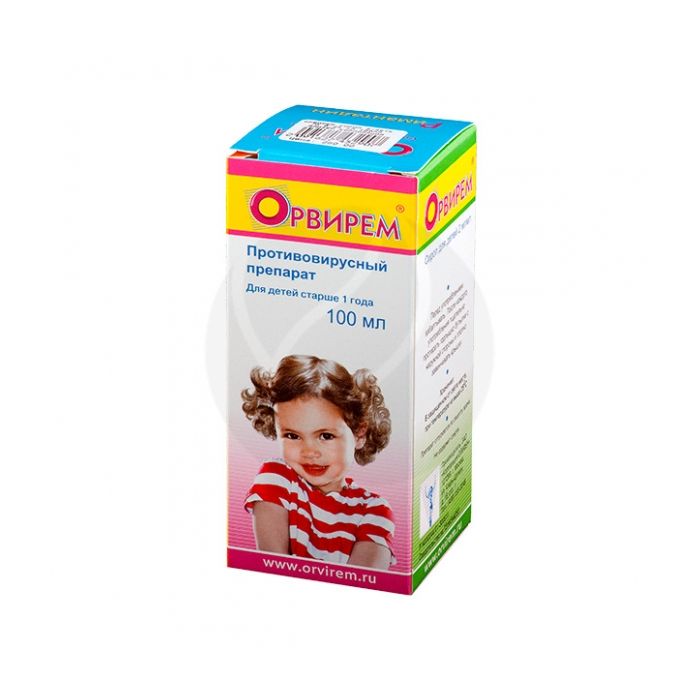Orvirem syrup 0.2%, 100 ml
Expiration Date: 11/2025
Russian Pharmacy name:
Орвирем сироп 0,2%, 100 мл
Individual, depending on the indications, the age of the patient and the treatment regimen used.
Active substance:
rimantadine 2mg per ml
Excipients:
sugar, sodium alginate, E122 dye, purified water.
Acute liver disease
acute and chronic kidney disease,
thyrotoxicosis,
pregnancy, d
children's age, depending on the dosage form used,
hypersensitivity to rimantadine.
pharmachologic effect
Antiviral agent derived from adamantane. The main mechanism of antiviral action is inhibition of the early stage of specific reproduction after the penetration of the virus into the cell and before the initial transcription of RNA. Pharmacological efficacy is ensured by inhibiting the reproduction of the virus at the initial stage of the infectious process. It is active against various strains of influenza A virus (especially type A2), as well as tick-borne encephalitis viruses (Central European and Russian spring-summer), which belong to the group of arboviruses of the Flaviviridae family.
Side effect
From the digestive system: epigastric pain, flatulence, increased levels of bilirubin in the blood, dry mouth, anorexia, nausea, vomiting, gastralgia. From the side of the central nervous system: headache, insomnia, nervousness, dizziness, impaired concentration, drowsiness, anxiety, increased excitability, fatigue. Others: allergic reactions.
Application during pregnancy and lactation
Contraindicated in pregnancy.
Application for violations of liver function
Contraindicated in acute liver disease.
Application for impaired renal function
Contraindicated in acute and chronic kidney disease.
Use in elderly patients
Elderly patients with arterial hypertension increase the risk of developing hemorrhagic stroke.
special instructions
Rimantadine is used with caution in arterial hypertension, epilepsy (including history), cerebral atherosclerosis. With the use of rimantadine, an exacerbation of chronic concomitant diseases is possible. In elderly patients with arterial hypertension, the risk of developing hemorrhagic stroke increases. With indications of a history of epilepsy and ongoing anticonvulsant therapy, with the use of rimantadine, the risk of developing an epileptic seizure increases. In such cases, rimantadine is used at a dose of up to 100 mg / day concurrently with anticonvulsant therapy. In influenza caused by the B virus, rimantadine has an antitoxic effect. Prophylactic reception is effective in contact with sick people,with the spread of infection in closed groups and with a high risk of disease during an influenza epidemic. The emergence of drug-resistant viruses is possible.
Drug interactions
With the simultaneous use of rimantadine reduces the effectiveness of antiepileptic drugs. Adsorbents, astringents and coating agents reduce the absorption of rimantadine. Urine acidifying agents (ammonium chloride, ascorbic acid) reduce the effectiveness of rimantadine (due to increased renal excretion). Means that alkalinize urine (acetazolamide, sodium bicarbonate) increase its effectiveness (decrease in renal excretion). Paracetamol and acetylsalicylic acid reduce the Cmax of rimantadine by 11%. Cimetidine reduces the clearance of rimantadine by 18%.

